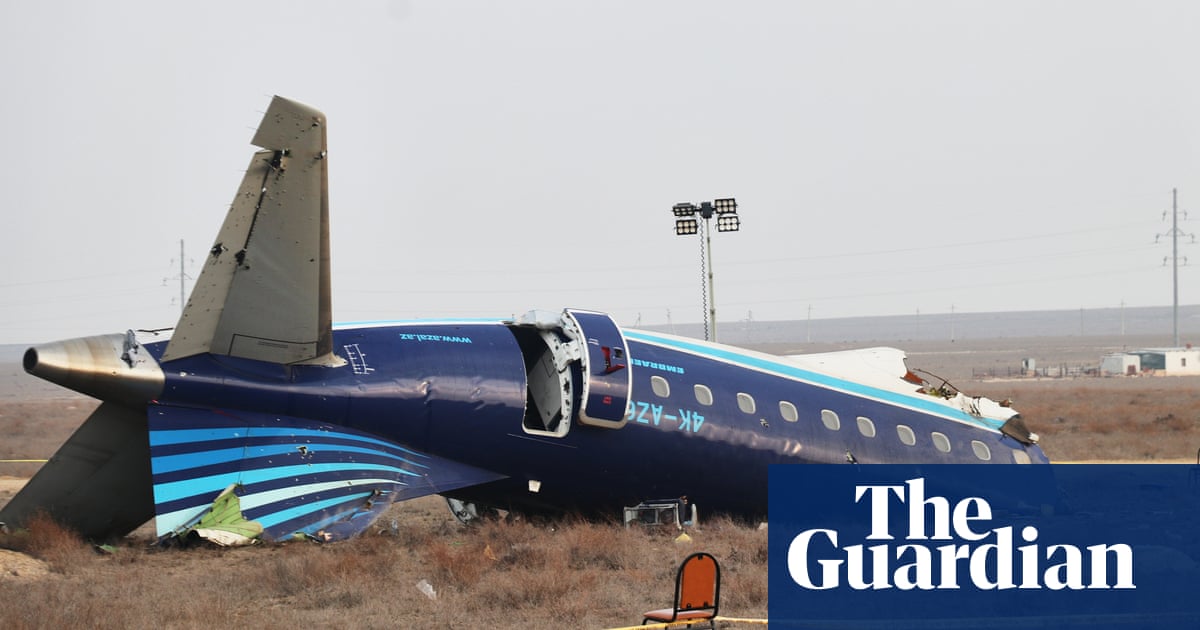The aircraft involved in the Christmas Day plane crash in Kazakhstan that killed 38 people experienced “external physical and technical interference”, according to preliminary results of an investigation, Azerbaijan Airlines said on Friday.
The early findings led the carrier to suspend flights to five Russian airports, citing “potential risks to flight safety”, adding to the two routes that were suspended immediately after the crash.
The plane was flying from the Azerbaijani capital, Baku, to the Russian city of Grozny in Chechnya when it crashed in a field near Aktau in Kazakhstan, hundreds of miles off its planned route. Twenty-nine people survived.
On Friday, the head of Russia’s civil aviation agency said that the aircraft had tried to land in Grozny as the region was under attack by Ukrainian drones.
“Ukrainian military drones were carrying out terrorist attacks on civilian infrastructure … at the time,” Dmitry Yadrov said on Telegram, adding that the plane had made two unsuccessful attempts to land.
At the time there was also heavy fog over Grozny, he said. He described the conditions as “very complicated”. He added: “The pilot was offered alternative airports. He took the decision to go to Aktau airport.”
As hospitals scrambled to treat the dozens of injured passengers and Azerbaijan mourned those who lost their lives, speculation has swirled about the cause of the crash. A US official said on Thursday that there were early indications that a Russian anti-aircraft system may have struck the plane, echoing claims by Ukrainian officials and sources in Azerbaijan.
On Friday, the Kremlin’s spokesperson, Dmitry Peskov, declined to comment on the claims. “The air incident is being investigated and we don’t believe we have the right to make any assessments until the conclusions are made as a result of the investigation,” he told reporters.
Images of the crash appeared to show the plane plummeting to the ground where it burst into flames on impact, giving rise to thick, black plumes of smoke.
A passenger on the plane told Reuters that he had heard at least one loud bang as the aircraft approached Russia’s southern Chechnya region. “I thought the plane was going to fall apart,” Subhonkul Rakhimov said. “It was as if it was drunk – not the same plane any more.”
Rakhimov also spoke to the Russian state broadcaster, RT, and said it seemed as though the explosion had taken place outside the plane, and shrapnel had punctured the body of the aircraft.
“I grabbed a lifejacket and saw there was a hole in it – it was pierced by shrapnel,” he said. “Somewhere between my legs this piece of shrapnel flew in and went right through the lifejacket.”
In recent weeks, Ukrainian drones have targeted several sites in Chechnya, including a facility housing local police forces.
On Wednesday morning – the same day as the crash – Khamzat Kadyrov, a local security official and nephew of the Chechen leader, Ramzan Kadyrov, wrote on Instagram that “all drones were successfully shot down”.
The crash led other airlines to suspend flights through the region; Kazakhstan’s Qazaq Air said it would halt flights from Astana to the Russian city of Ekaterinburg in the Ural Mountains for one month, while the budget carrier flydubai suspended flights to the southern Russian airports of Sochi and Mineralnye Vody. Israel’s El Al also said it would suspend flights from Tel Aviv to Moscow for one week, citing “developments in Russia’s airspace”.
Hours later, a source in Azerbaijan told Reuters that early findings suggested that the plane had been mistakenly downed by a Russian Pantsir-S air defence system. One Azerbaijani lawmaker, Rasim Musabekov, called on Russia to officially apologise.
“They have to accept this, punish those to blame, promise that such a thing will not happen again, express regrets and readiness to pay compensation,” Musabekov told the news agency AFP. “We are waiting for Russia to do this.”
He said the plane “was damaged in the sky over Grozny and asked to make an emergency landing”, describing it as a standard request.
He alleged that the plane was not allowed to land at Grozny or nearby Russian airports and was instead “sent far away” across the Caspian Sea to Kazakhstan with the “GPS switched off”, Musabekov said.
If air defences were operating near Grozny airport, “they should have closed the airspace. The plane should have been turned around as it approached Grozny. Why wasn’t this done?” he added.
Reuters, Agence France-Presse and Associated Press contributed to this report

